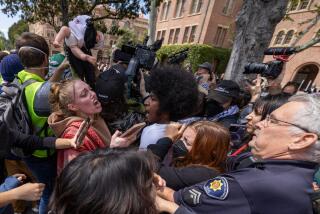Torch may burn sponsors
Samsung probably thought it was a slam-dunk marketing scheme: As the Olympic torch made its way around the world, people could send text messages to the company with the word “torch” and win a new cellphone.
As scores of demonstrators crowded the streets of downtown San Francisco on Wednesday to protest China’s occupation of Tibet, forcing a re-routing of the relay and the deployment of the city’s entire police force, it might not have looked like such a good idea.
“This is a global sponsor’s worst nightmare,” said Nicholas Didow, professor of marketing at the University of North Carolina’s Kenan-Flagler Business School. “At this point, it is as if you are sponsoring political and social conflict, rather than celebrating peace and unification.”
It is unclear whether Samsung’s text-message promotion had been wounded by anti-China demonstrations that have also disrupted the torch’s tour through Athens, London and Paris. Executives with the Seoul-based company didn’t return calls seeking comment.
Neither did representatives of Atlanta-based Coca-Cola Co., another corporate sponsor of the Olympic torch relay.
A spokeswoman for the third sponsor, Lenovo Group of China, issued a statement via e-mail: “Lenovo is proud to play a role in spreading the important values the Olympic Games embody -- unity, peace, and sponsorship.”
The spokeswoman added, “Understandably, we are disappointed by attempts to disrupt the relay.”
The pressure isn’t likely to let up as the torch continues on its 85,000-mile journey to Beijing, where the Summer Games begin in August. The Olympic flame is to travel through Chinese-controlled Tibet, where Buddhist monks and other residents have clashed with police in recent weeks.
The International Campaign for Tibet and 140 other advocacy groups recently sent a letter to Coca-Cola, asking the company to use its influence to keep the torch from passing through Tibet. Campaign spokesman Ben Carrdus said the group feared there would be more bloodshed.
Carrdus said the torch relay’s three corporate sponsors and the dozens of companies that sponsor the Games are naive to believe that they can separate sports from politics.
“The Olympics don’t exist in a vacuum. You can’t just cherry pick the profitable parts.”
Sponsors are smart to emphasize that they’re supporting athletes and the competitive spirit, and to steer clear of the human rights controversy, said David Carter, a sports marketing consultant and executive director of the USC Sports Business Institute.
“They need to position themselves as part of the solution,” he said.
A spokeswoman for General Electric Co., a sponsor of the Summer Games, said that although the concerns raised by protesters are valid, “the Olympics should not be used as a platform for political issues.”
Companies could change their tunes if protesters call for a boycott of sponsors’ products, said Sergio Zyman, a former Coca-Cola chief marketing officer and founder of marketing consulting firm Zyman Group.
Unless that happens, he said, sponsors don’t have much to worry about.
“Every Olympics sooner or later ends up with a little bit of controversy,” Zyman said.
--
More to Read
Sign up for Essential California
The most important California stories and recommendations in your inbox every morning.
You may occasionally receive promotional content from the Los Angeles Times.











